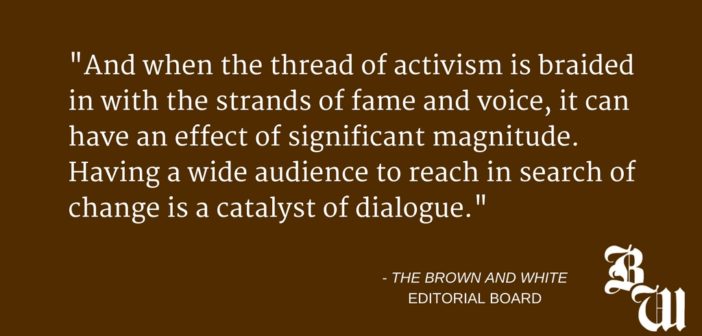With great power comes great responsibility.
If you’re wondering about the origin of that wise implication, it was ironically popularized by a source of power itself — the blockbuster hit, “Spiderman.”
Why is “Spiderman” power? Because pop culture is power. Though we are theoretically born with the same right to free speech, people who find themselves in the spotlight don’t have to project far for people to listen.
And when the thread of activism is braided in with the strands of fame and voice, it can have an effect of significant magnitude. Having a wide audience to reach in search of change is a catalyst of dialogue.
But some people take exception to such practices. They say actors, for example, “should stick to acting.”
The argument behind this idea is most celebrities, namely actors and athletes, do not have the specific expertise necessary to preach their ideas. Citing the same aforementioned responsibility derived from power, it can be dangerous to use their platforms if they are not experts.
However, just because celebrities are not experts by title does not mean they can’t focus their efforts on positive change in the social and political arenas. Furthermore, the title of actor or athlete does not remove a person’s ability to delve into an issue in a sophisticated manner.
An exemplary professional in both the cinematic and political scopes is Emma Watson. Even as someone who rose to fame as a child actor in the hit Harry Potter series, she defies all the stereotypes of a whimsical actor in pursuit of attention and her own agenda. Her qualifications to promote women’s rights includes being appointed as a UN Women Goodwill Ambassador in 2014.
But you don’t need to be the cookie-cutter, quintessential actor-activist Watson has established herself as to be valid.
What about Colin Kaepernick, who has been burnt to a crisp in criticism after he used his fame as an NFL quarterback to shed light on racial discrimination in the U.S.?
His situation was vastly discussed, and his opponents spouted varying problems they had about his message — he just wanted the attention, he didn’t actually deal with discrimination because he’s making millions of dollars, etc.
The irony came when inherited business mogul and reality TV star Donald Trump, who used his fame directly toward a political agenda, and his supporters spoke out against Kaepernick. How can you justify President Trump’s use of power to make change, while holding a different standard to Kaepernick, who aimed to accomplish the same goal in a silent, peaceful manner?
In fact, Trump was championed by the Republican party as someone who had the influence — in the form of platform and finances — to make a political difference without being corrupted by special interests.
The reality is, backers of Trump and Kaepernick stick with their beliefs not because of any sort of assessment of celebrity opinion, but because they believe in the message each one is preaching. It’s a simple confirmation bias that allows people to dismiss celebrities’ opinions only when they disagree.
A follow-up question anyone who feels passionately about this dilemma should ask themselves is: What would you do if you had a platform to share your opinions?
There is no easy answer, as it is a hypothetical situation one can only wish would come to fruition. But, the natural response to fame would be to stay true to yourself and use your elevated platform to speak out for what you believe is right.
Returning to the issue of speech, there is no fundamental change that occurs when fame enters the equation. We all still have our freedom of speech. But while speech stays constant, reach varies.
And that is why it’s important for celebrities who have such a wide reach to use it for the same issues the layperson feels strongly about. It is by no means a requirement, but it is an option worth considering.
The consideration must be strong, because it is a great responsibility to hold. But that responsibility only adds to the power.






Comment policy
Comments posted to The Brown and White website are reviewed by a moderator before being approved. Incendiary speech or harassing language, including comments targeted at individuals, may be deemed unacceptable and not published. Spam and other soliciting will also be declined.
The Brown and White also reserves the right to not publish entirely anonymous comments.
3 Comments
Big difference between Kaepernick & Trump. Trump was running for political office which allows him to take whatever position he wants as the voters will decide if they like his stance on issues.
In Kaepernick case he was a making a disrespectful statement to all of those who have fought for the liberties we all enjoy in disrespecting the Flag & national anthem. He did that as an employee while wearing the uniform for which he is paid to perform. That performance includes standing like everyone else. He suffered the consequences he deserved for being insubordinate to his duties.
Kaepernick again! I’ll pass on the national anthem issue.
The editorial states: “The reality is, backers of Kaepernick and Trump stick with their beliefs not because of any sort of assessment of celebrity opinion, but because they believe in the message each one is preaching. It’s a simple confirmation bias that allows people to dismiss celebrities’ opinions only when they disagree.”
I think there is something else more powerful than “belief in the message” going on. The reason celebrities get so many advertising opportunities is indeed because of “assessment of celebrity opinion”. The consumer is asked to identify with the celebrities’ ability, wealth, good looks etc. and to think, if it’s good enough for them surely it’s good enough for me. Celebrity is often used to get people to avoid actually thinking about the message.
On the flip side of the coin, many people disagree with the message of a celebrity because they do not like the person instead of evaluating the message itself. Is this what “confirmation bias” means?
Consider why you believe what you believe. Is it because you identify with the idea after much experience or thought or because you are rebelling against the holder of a different idea? Do you identify with only some aspect of the idea? Did you flip a coin or had to believe something for no good reason? As an example from another editorial, did the editorialist like the New York Jets because he identified with the underdog, as a reaction to his father liking the Giants or because he liked the color green and his choice was limited to New York.
In summary: believe what you believe bacause you are well informed and you have evaluated options; also re-evaluate your beliefs based on new experience or information.
I just read the article and found it really amazing for the readers like me. I really hope that I will get more in the future like this.